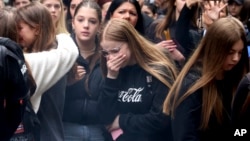A shooter killed at least eight people and wounded 13 in a drive-by attack near a town close to Belgrade late Thursday, the second such mass killing in Serbia in two days, state television reported.
The attacker shot randomly at people near the town of Mladenovac, some 50 kilometers south of the capital, the RTS report said early Friday. Police were looking for a 21-year-old suspect who fled after the attack, the report said.
No other details were immediately available, and police had not issued any statements.
School shooting
On Wednesday in Belgrade, a 13-year-old boy allegedly used his father's guns in a school shooting rampage that killed eight of his schoolmates and a school guard. The bloodshed sent shockwaves through the Balkan nation unused to such mass shootings.
Dozens of Serbian students, many wearing black and carrying flowers, paid silent homage Thursday to peers killed a day earlier.
The students filled the streets around the school in central Belgrade as they streamed in from all over the city. Earlier, thousands had lined up to lay flowers, light candles and leave toys to commemorate the eight children and a school guard who were killed on Wednesday morning.
The Balkan nation is struggling to come to terms with the school shooting. Though awash with weapons left over from the wars of the 1990s, mass shootings still have been extremely rare — and this is the first school shooting in Serbia's modern history.
Authorities on Thursday moved to boost gun control, as police urged citizens to lock up their guns and keep them safe, away from children.
"The Ministry of Interior is appealing to all gun owners to store their guns with care, locked up in safes or closets so they are out of reach of others, particularly children," police said in a statement that also announced tightened controls on gun owners in the future.
The shooting Wednesday morning in Vladislav Ribnikar primary school also left seven people hospitalized — six children and a teacher. One girl who was shot in the head remains in a life-threatening condition, and a boy is in serious condition with spinal injuries, doctors said on Thursday morning.
Serbians mourn, donate blood
To help people deal with the tragedy, authorities announced they were setting up a helpline. Hundreds answered a call to donate blood for the wounded victims. A three-day mourning period will begin Friday morning.
Serbian teachers' unions announced protests and strikes to demand changes and warn about a crisis in the school system. Authorities shrugged off responsibility, with some officials blaming Western influence rather than a deep social crisis in the country.
The alleged shooter, whom the police identified as Kosta Kecmanovic, has not given any motive for his actions.
Authorities have said that Kecmanovic is too young to be charged and tried. He has been placed in a mental institution while his father has been detained on suspicion of endangering public security because his son allegedly got hold of the guns.
'Too much violence'
Gun culture is widespread in Serbia and elsewhere in the Balkans: The region is among the top in Europe in the number of guns per capita. Guns are often fired into the air at celebrations and the cult of the warrior is part of national identity. Still, the last mass shooting was in 2013 when a war veteran killed 13 people in a central Serbian village.
Experts have repeatedly warned of the danger posed by the number of weapons in a highly divided country like Serbia, where convicted war criminals are glorified and violence against minority groups often goes unpunished. They also note that decades of instability stemming from the conflicts of the 1990s as well as ongoing economic hardship could trigger such outbursts.
"We have had too much violence for too long," psychologist Zarko Trebjesanin told N1 television. "Children copy models. We need to eliminate negative models ... and create a different system of values."




